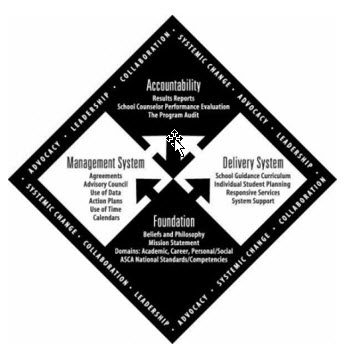Definition of School Counseling
School counselors are master’s level practitioners who help students in the following ways:
- Removing barriers to academic achievement
- Supporting social/emotional development
- Guiding college and career readiness
School counselors use the following tools to help students:
- Small-group counseling
- Individual counseling
- School counseling core curriculum lessons
A new role for school counselors emerged in the 1990s and 2000s. In this new role, school counselors are no longer focused on scheduling, filing papers, and handing out college applications. Instead, school counselors work with all students and are vital members of school leadership teams. The majority of school counselors’ time is spent in direct service with students. This service may include:
- student academic planning
- counseling with frequently absent students
- assisting students in exploring future careers
- counseling students with academic concerns
- designing and conducting school counseling core curriculum lessons
- consulting with teachers about classroom management
- helping school principals identify and address student needs
- counseling students in crisis
- assisting students in applying for college
- leading small counseling groups with students with shared concerns
- advocating for students at individual education plan meetings
- analyzing school wide data to understand student needs
More information on the role of professional school counselors can be found on the website of the American School Counselor Association (ASCA). See:
What Does a School Counselor Do?
http://www.schoolcounselor.org/press/what-does-a-school-counselor-do
School Counseling Careers/Roles
http://www.schoolcounselor.org/school-counselors-members/careers-roles
ASCA Position Statements
http://www.schoolcounselor.org/school-counselors-members/about-asca-(1)/position-statements
ASCA National Model
The ASCA National Model (2010) guides the new role of school counselors in outlining how to create data-driven, comprehensive school counseling programs. The model demonstrates how school counselors can design programs with four components: Foundation, Management System, Delivery System, and Accountability. These components are influenced by four themes: Systemic Change, Advocacy, Leadership, and Collaboration.
